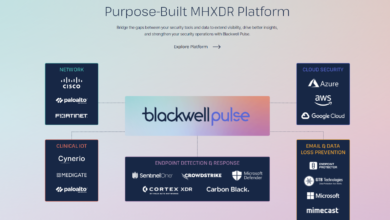AI is Our Secret Weapon Against Hackers!

In an exclusive interview with CNBC, Gil Shwed, the Founder and CEO of Check Point Software Technologies, provided insights into the current state of the cybersecurity market and the transformative role of artificial intelligence (AI) in product development. Despite a mixed demand environment, Shwed emphasized the importance of cybersecurity solutions and highlighted the innovative strides Check Point is making with AI to enhance data protection.
Navigating a Mixed Demand Environment
Discussing Check Point’s financial outlook, Shwed acknowledged the challenges faced by the broader enterprise software market. “The demand environment is mixed,” he admitted. While general enterprise solutions are facing challenges, the demand for cybersecurity solutions remains very strong.” Despite the cautious approach to guidance, Shwed expressed confidence in Check Point’s pipeline and prospects. “We are seeing a good pipeline and want to be cautious,” he explained, underscoring the company’s strategic prudence amidst market fluctuations.
Shwed elaborated on the factors contributing to the robust demand for cybersecurity solutions. “With the increasing frequency and sophistication of cyberattacks, organizations are more aware than ever of the need for comprehensive security measures,” he said. He pointed to recent high-profile breaches as driving factors behind this heightened awareness and subsequent demand. “Every time a major breach makes headlines, it serves as a wake-up call for businesses about the critical importance of cybersecurity,” Shwed added.
Despite the overall positive outlook for cybersecurity, Shwed emphasized the need for continuous adaptation and innovation. “The cyber threat landscape is constantly evolving, and we need to stay ahead of the curve,” he noted. This dynamic environment requires not only advanced technological solutions but also agile strategies to meet emerging challenges. “Our focus is on developing solutions that can adapt to new threats as they arise,” he said. This proactive approach ensures that Check Point remains a leader in the cybersecurity market.
Shwed also highlighted the importance of balancing short-term performance with long-term strategic goals. “While we are cautious about immediate revenue projections, our long-term strategy is centered around sustainable growth and innovation,” he explained. This balanced approach allows Check Point to navigate current market uncertainties while positioning itself for future success. “We are committed to investing in R&D and expanding our capabilities to meet the evolving needs of our customers,” Shwed affirmed.
In addition to technological advancements, Shwed emphasized the role of customer relationships in navigating the mixed-demand environment. “Building strong, trust-based relationships with our customers is crucial,” he said. “By understanding their specific needs and challenges, we can tailor our solutions to provide maximum value.” This customer-centric approach enhances satisfaction and drives loyalty and long-term partnerships. “Our goal is to be a trusted partner, helping our customers navigate the complex cybersecurity landscape,” Shwed concluded.
Overall, Shwed’s insights paint a picture of a company that is aware of its challenges and equipped with the strategies and innovations needed to thrive. As Check Point continues to navigate the mixed-demand environment, its focus on customer-centric solutions, continuous innovation, and strategic prudence will be key to its ongoing success. “We are optimistic about the future and confident in our ability to deliver cutting-edge cybersecurity solutions,” Shwed affirmed.
Leveraging AI with A.I. Copilot
One of the most exciting developments at Check Point is the rollout of A.I. Copilot, a tool designed to streamline and enhance cybersecurity operations through AI. “We started with A.I. Copilot at the beginning of the year,” Shwed shared. The tool utilizes natural language processing to perform complex tasks requiring significant time and expertise. “An investigation that could take days and changing permissions can all be organized with the interface,” he noted. This simplification of complex processes has been met with positive reception from customers. “We see good reception in the customer interface,” Shwed said, highlighting the practical benefits of AI integration.
Shwed elaborated on the transformative potential of A.I. Copilot in reducing the burden on cybersecurity teams. “A.I. Copilot automates many of the tedious and time-consuming tasks, allowing our security professionals to focus on more strategic and high-impact activities,” he explained. This automation is crucial in an industry where speed and efficiency can mean the difference between thwarting an attack and suffering a breach. “By automating routine tasks, we enable our teams to respond to threats more swiftly and effectively,” he added.
The AI-driven capabilities of A.I. Copilot also extend to predictive analytics and threat intelligence. “A.I. Copilot uses advanced algorithms to predict potential threats before they materialize,” Shwed said. This predictive capability allows organizations to take preemptive measures, enhancing their overall security posture. “Instead of reacting to threats as they occur, we can anticipate and mitigate them, which significantly improves our defensive strategies,” he emphasized.
High turnover rates among CISOs, often due to burnout from constant “firefighting,” hinder long-term strategic planning.
That’s why organizations need to invest in AI and consolidate #security, our CISO, Jony Fischbein, writes in @Forbes.https://t.co/rNrLDvo3g6
— Check Point Software (@CheckPointSW) June 3, 2024
Customer feedback has been overwhelmingly positive, with many highlighting the tool’s ease of use and effectiveness. “Our customers appreciate how intuitive and user-friendly A.I. Copilot is,” Shwed noted. “They’ve told us that the tool has significantly reduced their workload and improved their operational efficiency.” This positive feedback underscores the real-world impact of A.I. Copilot and its value in enhancing cybersecurity practices. “The ability to quickly organize and analyze data through a user-friendly interface is a game-changer for many of our clients,” Shwed said.
Moreover, Shwed highlighted the importance of improving and adapting A.I. Copilot. “We are committed to continuously enhancing A.I. Copilot’s capabilities based on user feedback and emerging threat landscapes,” he stated. This iterative approach ensures that the tool remains relevant and effective in the face of evolving cyber threats. “As new threats emerge, we are constantly updating A.I. Copilot to ensure it can handle the latest challenges,” he added.
The collaboration with Microsoft Azure and OpenAI has been instrumental in developing and deploying A.I. Copilot. “Working with industry leaders like Microsoft Azure and OpenAI provides us with the cutting-edge technology and infrastructure needed to support A.I. Copilot,” Shwed explained. This partnership ensures that A.I. Copilot is built on a robust and secure platform, offering reliable and scalable solutions to customers. “Our collaboration ensures that A.I. Copilot leverages the best AI technologies available while maintaining strict data privacy standards,” he noted.
A.I. Copilot significantly advances Check Point’s cybersecurity arsenal. By leveraging artificial intelligence, the tool simplifies complex tasks, enhances predictive capabilities, and improves operational efficiency. “A.I. Copilot is a testament to our commitment to innovation and excellence in cybersecurity,” Shwed affirmed. As Check Point continues to refine and expand the capabilities of A.I. Copilot, it stands poised to set new standards in the industry, ensuring robust protection for its clients in an increasingly digital world. “We are excited about the future and the potential of A.I. Copilot to transform cybersecurity operations,” Shwed concluded.
Collaboration with Microsoft Azure and OpenAI
Check Point’s collaboration with Microsoft Azure and OpenAI plays a crucial role in the development and deployment of their AI solutions. “We found the best engine that provides an environment private to our customers,” Shwed explained. Ensuring customer data privacy while leveraging powerful AI capabilities is a priority for Check Point. “Our collaboration ensures that customer data is not shared with others; we have our own universe,” he added. This approach underscores Check Point’s commitment to maintaining high standards of data security and privacy.
Shwed elaborated on the benefits of these partnerships, emphasizing the synergy between Check Point’s cybersecurity expertise and the advanced AI technologies from Microsoft and OpenAI. “Partnering with Microsoft Azure and OpenAI allows us to integrate cutting-edge AI into our cybersecurity solutions seamlessly,” he said. “Their technology provides the robust infrastructure and innovative AI models that enhance our capabilities.” This integration enables Check Point to deliver customers more efficient and effective security solutions.
The collaboration has also facilitated the development of customized AI models tailored specifically to Check Point’s security needs. “Working with OpenAI, we’ve developed bespoke AI models that address the unique challenges of cybersecurity,” Shwed noted. These models are designed to detect and respond to threats more accurately, reducing the likelihood of false positives and improving overall security outcomes. “Our custom AI models are a direct result of the collaborative efforts with OpenAI, leveraging their expertise to enhance our solutions,” he added.
Microsoft Azure’s cloud infrastructure provides the scalability and reliability needed to support Check Point’s AI-driven solutions. “Azure’s cloud platform ensures that our AI solutions can scale to meet the demands of our global customer base,” Shwed explained. This scalability is crucial for providing consistent and reliable service to clients, regardless of size or location. “Whether we’re protecting a small business or a large enterprise, Azure’s infrastructure supports our efforts to deliver top-notch security,” he emphasized.
The partnership also brings together a wealth of resources and knowledge, fostering innovation and continuous improvement. “Collaborating with industry leaders like Microsoft and OpenAI gives us access to the latest research, technology, and best practices,” Shwed said. This access allows Check Point to stay ahead of emerging threats and continuously enhance its security offerings. “The combined expertise of our partners enriches our development process and ensures that we are always at the forefront of cybersecurity innovation,” he added.
Customer feedback on the integrated solutions has been overwhelmingly positive, highlighting the enhanced security and efficiency provided by the collaborative efforts. “Our customers have reported significant improvements in their security operations since integrating our AI-driven solutions,” Shwed stated. The collaboration has enabled Check Point to offer solutions that meet and exceed customer expectations. “By leveraging the strengths of our partners, we’ve been able to deliver security solutions that are both powerful and user-friendly,” he noted.
In conclusion, the collaboration with Microsoft Azure and OpenAI represents a significant strategic advantage for Check Point. By integrating advanced AI technologies and leveraging robust cloud infrastructure, Check Point can offer enhanced cybersecurity solutions that address the evolving threat landscape. “Our partnerships with Microsoft and OpenAI are key to our mission of providing comprehensive and effective security solutions,” Shwed affirmed. As these collaborations continue to evolve, Check Point is well-positioned to lead the industry in innovation and excellence. “We look forward to furthering our partnerships and continuing to deliver cutting-edge solutions to our customers,” Shwed concluded.
Embracing the Platform Strategy
Shwed also addressed Check Point’s strategic shift towards a platform-based approach despite some investor skepticism. “Last quarter, the platform strategy accounted for 10% of revenue; this quarter, it’s 13%,” he revealed. While the term ‘platformization’ has faced resistance from some investors, Shwed defended its importance. “It is very important to level the cybersecurity,” he stated. Integrating various technologies into a cohesive platform provides more effective and comprehensive security solutions. “When we get all of the technologies to collaborate, we have third parties with everything working together,” he explained. This holistic approach is designed to address multiple attack vectors, enhancing overall security.
Shwed elaborated on the necessity of a platform strategy in the current cybersecurity landscape. “Today’s cyber threats are more complex and interconnected than ever before,” he noted. “A fragmented approach with disparate tools and technologies is insufficient to combat sophisticated attacks.” By unifying these tools within a single platform, Check Point ensures that all aspects of cybersecurity are covered. “Our platform approach allows for seamless integration and communication between different security components, creating a more robust defense mechanism,” he added.
This platform strategy also facilitates better threat intelligence and faster response times. “With a unified platform, we can aggregate data from various sources and analyze it more efficiently,” Shwed explained. “This comprehensive view enables us to detect threats earlier and respond more quickly.” The ability to correlate data across different security layers provides deeper insights and more effective threat mitigation. “Our customers benefit from a holistic security posture that adapts to emerging threats in real time,” he emphasized.
Customer feedback has been a significant driver of the platform strategy’s development. “We’ve listened to our customers and their need for integrated solutions,” Shwed said. Many organizations struggle with managing multiple security vendors and tools, leading to inefficiencies and gaps in coverage. “Our platform strategy simplifies their security architecture, reducing complexity and operational overhead,” he added. This customer-centric approach has helped Check Point build stronger relationships and trust within the industry.
The platform strategy also supports scalability and flexibility, essential for businesses of all sizes. “Whether you’re a small business or a large enterprise, our platform can scale to meet your specific security needs,” Shwed pointed out. This adaptability ensures that organizations can tailor their security measures to their unique requirements without compromising on protection. “Our platform provides the flexibility to integrate additional technologies and adapt to new threats as they arise,” he said.
Moreover, Shwed highlighted the economic advantages of a platform approach. “By consolidating multiple security functions into a single platform, we can offer more cost-effective solutions,” he explained. This consolidation reduces customers’ total cost of ownership, making advanced cybersecurity more accessible. Our goal is to provide high-quality security solutions that deliver value without breaking the bank,” he emphasized.
In embracing the platform strategy, Check Point fosters greater cybersecurity community collaboration. “We are partnering with other technology providers to enhance our platform’s capabilities,” Shwed noted. This collaborative effort ensures that Check Point’s platform remains at the cutting edge of innovation. “By working together, we can leverage each other’s strengths and provide the best possible protection for our customers,” he added.
In conclusion, the platform strategy represents a pivotal shift in Check Point’s approach to cybersecurity. By integrating various technologies into a cohesive, scalable, and cost-effective platform, Check Point addresses the complexities of modern cyber threats more effectively. “Our platform strategy is about unifying our tools and technologies to provide comprehensive security solutions,” Shwed affirmed. As Check Point continues to refine and expand its platform, it is poised to lead the industry in delivering robust and adaptive cybersecurity measures. “We are committed to advancing our platform strategy and helping our customers stay ahead of the curve in cybersecurity,” Shwed concluded.
The Future of Cybersecurity
Looking ahead, Shwed emphasized the ongoing evolution of cyber threats and the need for innovative solutions to stay ahead. “The landscape is changing, and threat actors are evolving,” he said. Continuous investment in AI and platform strategies is crucial to avoid these threats. “We should keep coming back and investing in partnerships with customers and organizations to benefit from collective knowledge and resources,” he added. This forward-looking perspective reflects Check Point’s commitment to leading the industry in cybersecurity innovation.
Shwed highlighted the importance of artificial intelligence in shaping the future of cybersecurity. “AI is a game-changer for cybersecurity,” he asserted. “It allows us to predict and respond to threats more quickly and accurately than ever.” The integration of AI not only improves threat detection but also enhances response times, enabling organizations to mitigate risks before they escalate. “By leveraging AI, we can stay one step ahead of cyber criminals and protect our customers more effectively,” Shwed emphasized.
Collaboration and information sharing within the cybersecurity community will be critical in the future. “No single entity can tackle these threats alone,” Shwed noted. “Collaboration is key to staying ahead of cybercriminals.” By sharing insights and best practices, organizations can enhance their collective defenses and respond more effectively to emerging threats. “We need to work together to create a stronger, more resilient cybersecurity ecosystem,” he said. This collaborative approach is essential for building a united front against increasingly sophisticated cyber adversaries.
Shwed also pointed to the growing significance of regulatory compliance and data privacy in cybersecurity. “Regulations are becoming stricter, and organizations must ensure they comply with these evolving standards,” he explained. Ensuring data privacy and regulatory compliance will continue to be a priority for businesses globally. “Our solutions are designed to help organizations meet these requirements and safeguard their data against unauthorized access,” Shwed stated.
Emerging technologies such as quantum computing are also on the horizon, presenting opportunities and challenges for cybersecurity. “Quantum computing has the potential to revolutionize many fields, including cybersecurity,” Shwed remarked. “However, it also poses new risks that we need to prepare for.” Developing quantum-resistant encryption and other advanced security measures will be crucial as this technology becomes more prevalent. “We are already exploring ways to protect against the potential threats posed by quantum computing,” he added.
The human element remains a vital component of effective cybersecurity strategies. “Technology alone cannot solve all our problems,” Shwed emphasized. “We need skilled professionals who can understand and respond to threats in real-time.” Investing in cybersecurity education and training is essential to ensure a pipeline of talented individuals ready to tackle the challenges of tomorrow. “Our commitment to developing the next generation of cybersecurity experts is unwavering,” Shwed said.
In conclusion, the future of cybersecurity is marked by continuous evolution, innovation, and collaboration. Check Point’s focus on integrating advanced technologies such as AI, fostering partnerships, and staying ahead of emerging threats positions it as a leader in the industry. “The challenges are significant, but so are the opportunities,” Shwed concluded. “By working together and leveraging our collective expertise, we can create a safer and more secure digital world.” As the cybersecurity landscape continues to evolve, Check Point is committed to being at the forefront of these developments, ensuring robust protection for its customers. “We are optimistic about the future and confident in our ability to deliver cutting-edge cybersecurity solutions,” Shwed affirmed.



